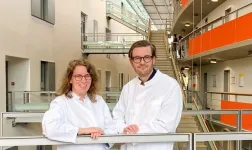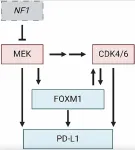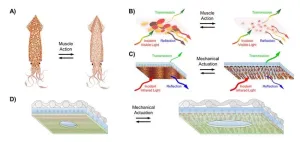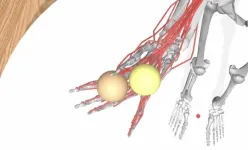(Press-News.org) The genetic confirmation of a suspected diagnosis of "hereditary colorectal cancer" is of great importance for the medical care of affected families. However, many of the variants identified in the known genes cannot yet be reliably classified in terms of their causal role in tumor formation. Under the leadership of the University Hospital Bonn (UKB) and the University of Bonn, an international team of researchers has reassessed the medical relevance of a significant number of unclear variants and thus significantly reduced their number. The results of the study have now been published in the renowned journal American Journal of Human Genetics.
Families with hereditary tumor diseases have a high risk of developing certain cancers such as colon cancer or breast cancer. For many common hereditary tumor syndromes, there are now very effective, intensive and early cancer screening programs and other preventive measures. Timely detection and reliable diagnosis of a hereditary predisposition is therefore extremely important for the families affected.
Due to increasingly comprehensive genetic testing, however, more and more genetic variants are being found in the responsible genes whose causal significance for the development of tumors is still unclear. These are referred to as variants of uncertain significance (VUS). As a result, more than 50 percent of the variants for some genes listed in public international databases (in particular ClinVar) are now VUS. "These cannot be used for diagnosis or for testing healthy people at risk; on the other hand, they often create great uncertainty, as carriers of a VUS may have an increased tumor risk," says co-senior author Dr. Isabel Spier from the Institute of Human Genetics.
Many gene variants have no relevance for tumor formation
Researchers at the UKB's Center for Hereditary Tumor Syndromes have been working for years on identifying new genetic causes of hereditary tumor diseases. To solve the problems associated with the interpretation of VUS, special classification criteria were developed under the leadership of the Institute of Human Genetics to improve the assessment of variants in the APC gene. Hereditary genetic changes in this gene are responsible for familial adenomatous polyposis (FAP), one of the most common causes of hereditary colorectal cancer or hereditary polyp diseases of the gastrointestinal tract. As part of the Hereditary Colorectal Cancer / Polyposis Variant Curation Expert Panel (VCEP), Prof. Stefan Aretz's research group is working with an international and multidisciplinary team of experts based on a collaboration between the International Society for Gastrointestinal Hereditary Tumors (InSiGHT) and the Clinical Genome Resource (ClinGen). "The gene-specific classification criteria we developed have now allowed us to reclassify a significant proportion of VUS of the APC gene into a medically relevant category," says Prof. Aretz, who is also a member of the Transdisciplinary Research Area (TRA) "Life & Health" at the University of Bonn.
The research team evaluated all of the more than 10,000 APC germline variants listed in the public databases ClinVar and LOVD. Among the variants with an initial classification as benign or pathogenic, about 95 percent remained in their original category. In contrast, 41 percent of the VUS deposited in ClinVar and 61 percent of those in LOVD were reclassified into clinically significant classes, the vast majority of them as benign. It was also shown that extensive data mining, i.e. the comprehensive search for all genetic and clinical information available worldwide on a genetic variant, contributes very effectively to a better classification. Overall, the total number of VUS was reduced by 37 percent. "Since we were able to evaluate a large proportion of VUS as harmless norm variants, all carriers of these variants worldwide are relieved," says co-senior author Prof. Aretz, who would like to emphasize the close collaboration with first author Dr. Xiaoyu Yin from Melbourne in Australia during her six-months stay as a guest scientist at the UKB. The study also demonstrates the feasibility of variant classification in large data sets, which could also serve as a generalizable model for the interpretation of variants of other genes in the future.
END
More clarity on hereditary colorectal cancer
Bonn researchers reclassify leading gene variants, a large proportion of them as benign
2024-10-01
ELSE PRESS RELEASES FROM THIS DATE:
FOXM1 and PD-L1 in CDK4/6-MEK resistance in nerve tumors
2024-10-01
“We suggest that future therapeutic strategies targeting the oncogenic network of CDK4/6, MEK, PD-L1, and FOXM1 represent exciting future treatment options for MPNST patients.”
BUFFALO, NY- October 1, 2024 – A new mini review was published in Oncotarget's Volume 15 on September 30, 2024, entitled, “Linking FOXM1 and PD-L1 to CDK4/6-MEK targeted therapy resistance in malignant peripheral nerve sheath tumors.”
As highlighted in the abstract of this paper, malignant peripheral nerve sheath tumors (MPNSTs) are aggressive, Ras-driven sarcomas characterized ...
McMaster University researchers identify new therapeutic approach to preventing cancer from spreading to the brain
2024-10-01
Researchers at McMaster University have identified a new therapeutic approach to preventing cancer from spreading to the brain.
In a new study, published recently in the journal Cell Reports Medicine, researchers Sheila Singh and Jakob Magolan discovered a critical vulnerability in metastatic brain cancer, which they say can be exploited with new drugs to prevent spread.
Singh, a professor in McMaster’s Department of Surgery and director of the Centre for Discovery in Cancer Research, says brain metastases are becoming increasingly prevalent and are extremely fatal, with 90 per cent of patients dying within one ...
Squid-inspired fabric for temperature-controlled clothing
2024-10-01
WASHINGTON, October 1, 2024 – Too warm with a jacket on but too cold without it? Athletic apparel brands boast temperature-controlling fabrics that adapt to every climate with lightweight but warm products. Yet, consider a fabric that you can adjust to fit your specific temperature needs.
Inspired by the dynamic color-changing properties of squid skin, researchers from the University of California, Irvine developed a method to manufacture a heat-adjusting material that is breathable and washable and can be integrated into flexible fabric. They published their ...
Using antimatter to detect nuclear radiation
2024-10-01
WASHINGTON, Oct. 1, 2024 – Nuclear fission reactors act as a key power source for many parts of the world and worldwide power capacity is expected to nearly double by 2050. One issue, however, is the difficulty of discerning whether a nuclear reactor is being used to also create material for nuclear weapons. Capturing and analyzing antimatter particles has shown promise for monitoring what specific reactor operations are occurring, even from hundreds of miles away.
In AIP Advances, by AIP Publishing, researchers from the University of Sheffield and the University of Hawaii developed ...
Modeling the minutia of motor manipulation with AI
2024-10-01
In neuroscience and biomedical engineering, accurately modeling the complex movements of the human hand has long been a significant challenge. Current models often struggle to capture the intricate interplay between the brain's motor commands and the physical actions of muscles and tendons. This gap not only hinders scientific progress but also limits the development of effective neuroprosthetics aimed at restoring hand function for those with limb loss or paralysis.
EPFL professor Alexander Mathis and his team have developed an AI-driven approach that ...
Survival gap eliminated for Black cord blood recipients with blood cancers, study finds
2024-10-01
Patients who receive umbilical cord blood transplants for blood cancers now live equally long regardless of their race, new research from UVA Cancer Center shows.
The findings, from UVA Health’s Karen Ballen, MD, and collaborators, suggests that a previously identified survival gap for Black recipients has closed and that overall survival for all recipients has increased.
The retrospective analysis looked at more than 2,600 adults and children with blood cancers who received cord blood between 2007 and 2017 ...
Nominate a stroke hero today: 2025 Stroke Hero Awards open for submissions
2024-10-01
DALLAS, Oct. 1, 2024 – Strokes can strike at any age, challenging survivors to overcome physical, emotional and cognitive changes. Nominations are open now for the 2025 Stroke Hero Awards from the American Stroke Association, a division of the American Heart Association, which is celebrating a century of lifesaving impact this year. The awards recognize stroke survivors, caregivers, advocates and experts making a difference in the stroke community.
Every 40 seconds someone in the U.S. has a stroke[1], according to the American Heart Association’s 2024 Heart Disease and Stroke Statistical Update. Nearly 1 in 4 stroke survivors face the ...
Seven years on, INSEAD study reveals #MeToo's unexpected impact
2024-10-01
Seven years after actor Alyssa Milano’s tweet launched the #MeToo movement into the global consciousness, attitudes towards sexual harassment and assault have shifted in many countries. A new study shows that the movement’s impact doesn’t stop there.
INSEAD professors Frédéric Godart and David Dubois, alongside Clément Bellet of Erasmus University Rotterdam, found that #MeToo triggered far-reaching changes in consumer behaviour. Sales of stereotypically feminine shoes like high heels dropped significantly weeks after the #MeToo movement swept the media ...
Addressing the geriatric healthcare workforce shortage
2024-10-01
INDIANAPOLIS – The pandemic has highlighted the acute shortage of nurses and nursing assistants needed to care for the growing number of older adults in long-term care facilities. Yet getting nursing students excited, engaged and feeling competent to take on the challenges of caring for nursing home patients has proved elusive.
To address this critical workforce gap, researchers from Regenstrief Institute and the Indiana University School of Medicine have developed and tested an innovative curriculum for nursing students, exposing ...
Age trumps gender, income and postcode for consumers' clothing habits
2024-10-01
The first-ever nationwide study into how Australians use and dispose of clothing has revealed people are buying too many clothes and are unsure how to discard them responsibly.
Conducted by RMIT University and commissioned by the Kmart Group and the Queensland Government, a study of 3,080 Australians explored how they acquired, used and disposed of their clothing.
Australians are among the world’s biggest clothing consumers, importing 1.4 billion units or over 383,000 tonnes annually.
But each year, more than 200,000 tonnes of clothing is sent to landfill.
The authors recommend establishing a national textile collection program for unwearable clothing that ...
LAST 30 PRESS RELEASES:
A “smart fluid” you can reconfigure with temperature
New research suggests myopia is driven by how we use our eyes indoors
Scientists develop first-of-its-kind antibody to block Epstein Barr virus
With the right prompts, AI chatbots analyze big data accurately
Leisure-time physical activity and cancer mortality among cancer survivors
Chronic kidney disease severity and risk of cognitive impairment
Research highlights from the first Multidisciplinary Radiopharmaceutical Therapy Symposium
New guidelines from NCCN detail fundamental differences in cancer in children compared to adults
Four NYU faculty win Sloan Foundation research fellowships
Personal perception of body movement changes when using robotic prosthetics
Study shows brain responses to wildlife images can forecast online engagement — and could help conservation messaging
Extreme heat and drought at flowering could put future wheat harvests at risk
Harlequin ichthyosis: a comprehensive review of pathogenesis, diagnosis, and management
Smithsonian planetary scientists discover recent tectonic activity on the Moon
Government censorship of Chinese chatbots
Incorporating a robotic leg into one’s body image
Brain imaging reveals how wildlife photos open donor wallets
Wiley to expand Advanced Portfolio
Invisible battery parts finally seen with pioneering technique
Tropical forests generate rainfall worth billions, study finds
A yeast enzyme helps human cells overcome mitochondrial defects
Bacteria frozen in ancient underground ice cave found to be resistant against 10 modern antibiotics
Rhododendron-derived drugs now made by bacteria
Admissions for child maltreatment decreased during first phase of COVID-19 pandemic, but ICU admissions increased later
Power in motion: transforming energy harvesting with gyroscopes
Ketamine high NOT related to treatment success for people with alcohol problems, study finds
1 in 6 Medicare beneficiaries depend on telehealth for key medical care
Maps can encourage home radon testing in the right settings
Exploring the link between hearing loss and cognitive decline
Machine learning tool can predict serious transplant complications months earlier
[Press-News.org] More clarity on hereditary colorectal cancerBonn researchers reclassify leading gene variants, a large proportion of them as benign







